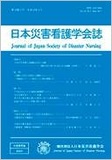Japanese
English
- 有料閲覧
- Abstract 文献概要
- 参考文献 Reference
要約
目的:大規模災害を乳幼児と経験した母親のストレス要因となる被災経験を明らかにする。
方法:阪神淡路大震災や新潟中越沖地震、東日本大震災等による乳幼児の母親の被災経験を詳細に記録した7件の書籍、報告書を対象として内容分析を行った。
結果:大規模災害を乳幼児と経験した母親は【避難所で生活できない】【いつも通りの子育てができない】【救援物資に頼れない】【心身に不調をきたす】【子どもの心身変化による負担】【家族関係が変化する】【生活の場所を求めて転々とする】【社会と繋がれずに孤立する】というストレス要因となる被災を経験していたことが明らかとなった。
結論:大規模災害後の母子への支援は、心身症状への対応の他、防災対策の推進、女性や子どもに配慮した避難所や救援物資を検討すること、そして母親が育児と社会活動を両立するためのサポートを提供することが重要であることが示唆された。
The purpose of this study was to clarify the cause of stress experienced by mothers with infants during large-scale disasters. Content analysis was done on seven recorded literatures with a detailed description of mothers with children aged 0-6 years who experienced the Great Hanshin Earthquake, Mid Niigata Prefecture Earthquake, and the Great East Japan Earthquake. The result of content analysis clarified eight negative experiences as follows: “impossible to live in public shelters,” “difficulty in child-vising as usual,” “impossible to rely on relief supplies,” “having poor mental and physical conditions,” “negative changes in the children's mental and physical conditions,” “negative changes in the family relationships,” “searching and moving to habitable places,” “being isolated and not being connected through social network.”
The results of this study indicate a preparedness issue of public shelters, public and private stocks before the impact. This study showed that distribution of relief supplies, reduction of stress, and prevention of isolation of mothers with children are required during a large-scale disaster.
Copyright © 2017, Japan Society of Disaster Nursing All rights reserved.


